Etten-Leur
Etten-Leur (Dutch pronunciation: [ˌɛtə(n) ˈløːr] ⓘ) is a municipality in the Dutch province North Brabant. Its name is a combination of the two villages from which the municipality originally acrose: Etten and Leur.
Etten-Leur | |
|---|---|
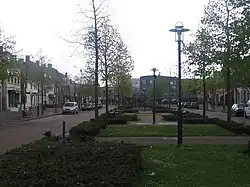 Street (Markt) in Etten-Leur | |
 Flag  Coat of arms | |
.svg.png.webp) Location in North Brabant | |
| Coordinates: 51°34′N 4°38′E | |
| Country | Netherlands |
| Province | North Brabant |
| Government | |
| • Body | Municipal council |
| • Mayor | Miranda de Vries (PvdA) |
| Area | |
| • Total | 55.92 km2 (21.59 sq mi) |
| • Land | 55.30 km2 (21.35 sq mi) |
| • Water | 0.62 km2 (0.24 sq mi) |
| Elevation | 8 m (26 ft) |
| Population (January 2021)[4] | |
| • Total | 43,869 |
| • Density | 793/km2 (2,050/sq mi) |
| Time zone | UTC+1 (CET) |
| • Summer (DST) | UTC+2 (CEST) |
| Postcode | 4870–4879 |
| Area code | 076 |
| Website | www |
History
The villages were always part of one municipality, originally called "Etten c.a." (cum annexis), this later to change to "Etten en Leur". The current name was adopted in 1968. By that time, the villages had grown into one.
Both villages, created in the Middle Ages, were relatively prosperous during the period of the Dutch Republic, the exception being the period of the Eighty Years' War in which the area was a major battleground.[5] This prosperity was caused by the fact that Etten was a centre for the production of peat,[6] and Leur was a local trading port, as it had a harbour.
Decline in economic importance marked both villages during the nineteenth century. In 1836 Arnold Damen left Leur in order to work as a missionary in the United States. The painter Vincent van Gogh briefly lived in Etten,[7] making him the most famous citizen in the history of Etten and Leur. During World War II, the two villages were freed from German occupation in late October 1944 by elements of the U.S. 104th Infantry Division.
The economic decline was halted when, in 1950, the Dutch government decided to encourage population growth and industrial development. As a result of this development, both towns have grown towards each other and merged into one: Etten-Leur.
Topography
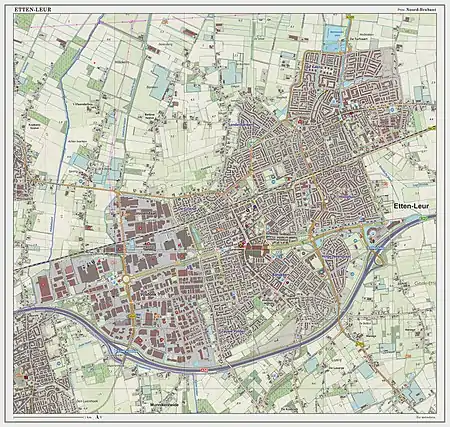 Dutch topographic map of Etten-Leur (town), March 2014
Dutch topographic map of Etten-Leur (town), March 2014
Education
- Katholieke Scholengemeenschap Etten-Leur, a Catholic high school
- Munnikenheide College
Transportation
Notable people
- Jan Jacob Rochussen (1797 in Etten – 1871) a Dutch politician; Finance Minister 1840/1843 and Governor-General of the Dutch East Indies 1845/1851
- Peter de Clercq (born 1959 in Etten-Leur) a Dutch diplomat, who currently works with the United Nations
- Stef Broks (born 1981 in Etten-Leur) a Dutch drummer, played with Textures
- Danny van Trijp (born 1996 in Etten-Leur) a Dutch Darts player, who currently plays in PDC events
- Vincent van Gogh opened his first art studio in Etten in 1881. His career as an artist began in Etten.
Gallery
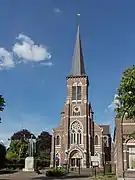 Church: de Sint Lambertuskerk
Church: de Sint Lambertuskerk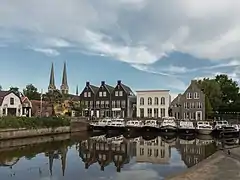 Port: de Leurse Haven
Port: de Leurse Haven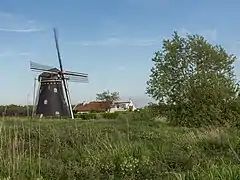 Windmill: de Zwartenbergse molen
Windmill: de Zwartenbergse molen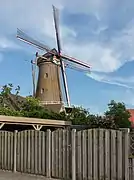 Windmill in modern quarter
Windmill in modern quarter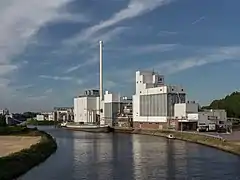 Factory (Hill's Pet Nutrition Manufacturing BV) at de Mark
Factory (Hill's Pet Nutrition Manufacturing BV) at de Mark
References
Notes
- "Het college van burgemeester en wethouders" [The board of mayor and aldermen] (in Dutch). Gemeente Etten-Leur. Retrieved 4 January 2018.
- "Kerncijfers wijken en buurten 2020" [Key figures for neighbourhoods 2020]. StatLine (in Dutch). CBS. 24 July 2020. Retrieved 19 September 2020.
- "Postcodetool for 4875AA". Actueel Hoogtebestand Nederland (in Dutch). Het Waterschapshuis. Retrieved 14 May 2014.
- "Bevolkingsontwikkeling; regio per maand" [Population growth; regions per month]. CBS Statline (in Dutch). CBS. 1 January 2021. Retrieved 2 January 2022.
- "Grensbataljon [Zuidfront Holland - Mei 1940]". www.zuidfront-holland1940.nl. Retrieved 2019-01-14.
- deoranjeboom.nl (PDF) https://deoranjeboom.nl/wp-content/uploads/2015/02/Jb-33-1980-01.pdf. Archived (PDF) from the original on 2019-01-14. Retrieved 2019-01-14.
{{cite web}}: Missing or empty|title=(help) - "Location Etten-Leur, Van Gogh Church - Van Gogh Brabant". www.vangoghbrabant.nl. Retrieved 2019-01-14.
Sources
- Information about the history of Etten-Leur has been retrieved from the Regional Archive of Western Brabant and Info Etten-Leur
External links
 Media related to Etten-Leur at Wikimedia Commons
Media related to Etten-Leur at Wikimedia Commons- Official website
